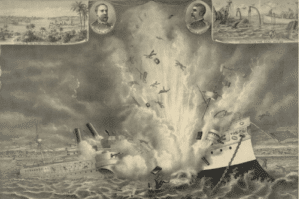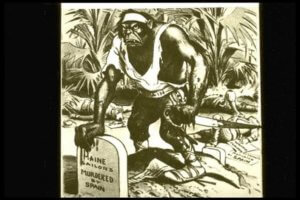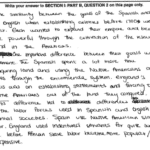If you’re reading this blog, you understand two things about the APUSH exam:
1. You need to study United States history
2. You need to practice taking the APUSH exam
For point number 1, look no further! Keep reading and you will get questions (and detailed answers!) about one key topic of the APUSH exam: American Imperialism.
First things first: what is American Imperialism?
Have you ever wondered why Puerto Rico is not a state, but Puerto Ricans are citizens of the United States (and have a non-voting member of Congress)? Well, if you’ve wondered these things – and even if you have not – you have been thinking about American Imperialism.
It’s important to note, before we begin, that when APUSH mentions American Imperialism, they are likely discussing the United States conflicts with Spain; however, there are other types of imperialism that the United States has been accused of, such as economic imperialism, cultural imperialism, and so on.
It’s also important to have a good understanding of what imperialism even means. If you’re confused, don’t worry; imperialism is a confusing concept because there are so many types, and it can be quite insidious. It’s not a bad idea to start with a dictionary definition, just to get us started. Merriam-Webster defines imperialism as “the extension or imposition of power, authority, or influence.” That will be enough to get us going.
Most history textbooks begin this story with the explosion of the USS Maine in Havana Harbor, and, for the most part, this makes sense. The explosion of the Maine killed two-thirds of the ship’s crew; that’s 268 people. If you are looking for a starting point of a conflict, the explosion of the Maine is a likely beginning; and the United States pointed the blame squarely at Spain. However, you are an excellent history student and you are going to be asking deeper questions at this point.

Destruction of the USS Maine on February 15, 1898. From the Stanford History Education Group.
Like, why was the USS Maine in Havana Harbor – which is in Cuba – in the first place?
And how did the United States know Spain was responsible?
Well, the United States was in Cuba to protect their own interests after Cubans began revolting Spanish Rule. (Remember: imperialism was the name of the game in the 19th centuries. European and Japanese powers were carving up the rest of the world as though it was their own, personal pie. The United States, just a fledgling country that had lost the lucrative – and exploitative – economic system of slavery, was interested in being a part of the gluttonous imperial festival.) And the United States didn’t have definitive proof regarding Spain’s culpability in the explosion – in fact, many historians question whether or not the explosion was an accident – but popular opinion latched onto the narrative of Spain as the aggressor. This popular opinion was swayed in large part by yellow journalism that quickly demonized the Spanish. This was the beginning of the Spanish-American War.
The Treaty of Paris, signed on December 10, 1898, concluded the Spanish-American War (if it can really be called a war; Spain was never very invested in it). As a result of the treaty, the United States were the “owners” of Guam, the Philippines, and Puerto Rico (with the exception of the Philippines, Guam and Puerto Rico remain permanently inhabited U.S. territories, along with the Northern Mariana Islands, the U.S. Virgin Islands, and American Samoa).
This was a very brief overview of American Imperialism; there is much more to learn (remember Step 1 above to do well on the APUSH exam: you need to study U.S. history!; this resource has more documents and background information to help you in your studying); this blog post does not cover the building of the Panama Canal, the Open Door Policy the US had with China, and other points of imperialist policy. The remainder of the blog post will get into questions regarding American Imperialism.
APUSH Sample Multiple Choice Questions on American Imperialism
First, let’s just ask some warm up questions about the Spanish-American War.

Political cartoon source here. Question source here.
1. Which of the following is the message of this political cartoon?
A. That the U.S. should remain neutral in the Cuban fight for independence.
B. That many Cubans are being murdered by the Spanish
C. That the naval officers aboard the USS Maine were murdered by the Spanish
D. That Spain should allow Cubans their independence
2. One important conclusion that can be drawn as a result of the Spanish American War is that
A. Only the President should decide issues of war and peace
B. The media are a powerful influence in shaping American public opinion toward war
C. The public has little confidence in the ability of the American military
D. International organizations play a decisive role in determining the outcome of war
Correct Answers:
1. C; the cartoon signals, in racist content, that the Spanish were responsible for the deaths of the crew of the USS Maine. This is an example of yellow journalism.
2. B; as the cartoon suggests, the media had a large hand in swaying public opinion and support for the Spanish-American War.
From College Board Sample Exam.
“[H]istory and experience prove that foreign influence is one of the most baneful foes of
republican government. . . . Excessive partiality for one foreign nation and excessive dislike
of another cause those whom they actuate to see danger only on one side and serve to veil
and even second the arts of influence on the other. . . . The great rule of conduct for us,
in regard to foreign nations, is in extending our commercial relations to have with them
as little political connection as possible. So far as we have already formed engagements,
let them be fulfilled with perfect good faith. Here let us stop. Europe has a set of primary
interests which to us have none, or a very remote relation. Hence she must be engaged in
frequent controversies, the causes of which are essentially foreign to our concerns.”
George Washington, Farewell Address, 1796
Most historians would argue that the recommendations of Washington’s address ceased
to have a significant influence on United States foreign policy as a result of
A. westward expansion in the nineteenth century
B. support for Cuban revolutionaries in the Spanish-American War
C. Woodrow Wilson’s support for international democratic principles during the First World War
D. involvement in the Second World War
Correct Answer:
D; George Washington is explaining that the United States should not get involved in the affairs of European countries, as the US only had a “very remote relation” to European problems. That should guide how you answer this question. Two of the responses were framed in terms of US interests; Westward expansion was mostly domestic, with the French and Spanish serving as proxies for policies the United States wanted to carry on at home and international democratic principles in the First World War were linked to domestic policies (and domestic safety). Support for Cuban Revolutionaries in the Spanish-American War is pertaining to the Western Hemisphere, not European problems. This is a policy best articulated by the Monroe Doctrine.
APUSH Sample Short Answer Question on American Imperialism
Fellow citizens, it is a noble land that God has given us; a land that can feed and clothe the world;.. . . It is a mighty people that he has planted on this soil . . . It is a glorious history our God has bestowed upon his chosen people; . . .a history of soldiers who carried the flag across the blazing deserts and through the ranks of hostile mountains, even to the gates of sunset
…
The Opposition tells us that we ought not to govern a people without their consent. I answer: The rule of liberty that all just government derives its authority from the consent of the governed, applies only to those who are capable of self-government. I answer, We govern the Indians without their consent, we govern our territories without their consent, we govern our children without their consent. They ask us how we will govern these new possessions. I answer: If England can govern foreign lands, so can America. If Germany can govern foreign lands, so can America.
. . .
In Cuba, alone, there are 15,000,000 acres of forest unacquainted with the axe. There are exhaustless mines of iron. . . . There are millions of acres yet unexplored. . . . It means new employment and better wages for every laboring man in the Union. . . .
Source: Albert J. Beveridge’s Senate campaign speech, September 16, 1898.
From Stanford History Education Group.
Answer (a), (b), and (c).
(a) Provide ONE example of how Beveridge’s speech supports the Spanish-American War.
(b) Explain whether or not Beveridge’s speech supports the idea that the explosion of the USS Maine as the most important cause of the Spanish-American War
(c) Explain ONE event from history that supports the ideas presented in Beveridge’s speech
Sample Answer:
(a) Beveridge provides an idea that Americans are ordained by God to take over foreign lands
(b) Beveridge’s speech does not support the idea of the USS Maine explosion as the most important cause of the Spanish-American War; instead, he cites economic and ideological reasons for imperialism
(c) The ideas of Manifest Destiny, the Monroe Doctrine, etc. support what Beveridge outlines in his speech by citing economic and moral fitness for the United States to expand



Leave a Reply